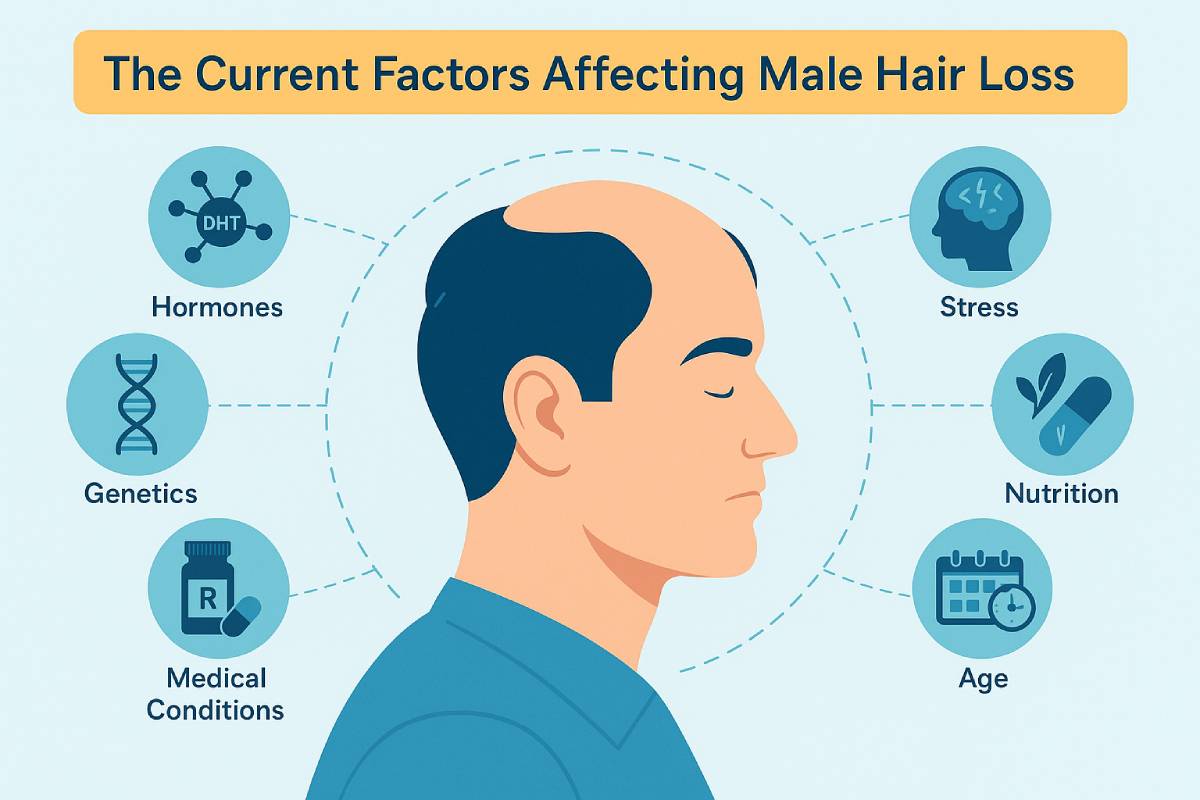One of the most prevalent issues impacting males globally is hair loss, which can have an impact on emotional health, social confidence, and self-worth. Although baldness and hair thinning have historically been accepted as normal aspects of aging, the truth is that hair loss can start considerably earlier and is impacted by a number of variables other than age.
Knowing what causes male hair loss has become more crucial in today’s fast-paced, extremely stressful environment. Treatment and prevention are difficult tasks since the reasons, which range from genetics to lifestyle choices, are frequently complicated and interconnected. This article examines the primary causes of male hair loss in the modern era, offering explanations for why it happens and practical solutions.
Hereditary Propensity and Hormonal Impact
Genetics is the most important element influencing male hair loss. Dihydrotestosterone (DHT), a derivative of testosterone, is the main cause of male pattern baldness, sometimes referred to as androgenetic alopecia, which is inherited. Hair follicles shrink and finally cease to produce hair as a result of DHT’s binding to them. Baldness and a receding hairline are far more common in men with a family history of it, and it frequently begins in their late teens or early twenties.
Numerous genes may be involved in the risk, according to research, with differences influencing how sensitive hair follicles are to hormonal fluctuations. It is essential to comprehend hereditary predisposition since it might direct treatment plans, including the use of DHT-blocking drugs or hair restoration techniques, as well as prophylactic measures.
Dietary and Lifestyle Elements
Lifestyle decisions have a significant impact on hair health. Male hair loss can be accelerated by smoking, excessive alcohol use, poor diet, and inactivity. Hair follicles can be weakened by diets deficient in vital vitamins and minerals, such as iron, zinc, vitamin D, and biotin, which increases the likelihood of hair loss.
Additionally, telogen effluvium, a disorder in which hair prematurely enters the shedding phase, is increasingly associated with high-stress lives. Hormonal changes brought on by prolonged stress, especially high cortisol levels, can interfere with the natural cycle of hair growth. A healthy, nutrient-dense diet, regular exercise, and stress-reduction methods like mindfulness or meditation can all help to prevent hair loss and enhance the general condition of hair.
The International Hair Restoration Scene
Regardless of culture or lifestyle, men on every continent suffer from hair loss, making it a truly worldwide problem. More men are looking for medical options outside of conventional treatments as awareness grows, with hair implants and transplants growing in popularity.
Results are now more natural-looking and long-lasting thanks to advancements in surgical techniques, including direct hair implantation (DHI) and follicular unit extraction (FUE). These procedures are available in clinics all around the world, but Australia is particularly well-known for its superior hair implant services. Australia draws both domestic and foreign clients looking for safe and efficient hair restoration options because of its stringent medical standards, state-of-the-art equipment, and skilled specialists.
Getting a hair implant in Australia and finding an expert in hair implants from Sydney is regarded as one of the greatest options available to guys worldwide who are searching for dependable and cutting-edge solutions.
Medications and Medical Conditions
Male hair loss can be brought on by or made worse by several illnesses and drugs. The natural cycle of hair development can be disrupted by thyroid conditions, autoimmune diseases such as alopecia areata, and infections of the scalp. Hair loss is a possible adverse effect of some drugs, such as those used to treat depression, hypertension, or chemotherapy. Chronic conditions like diabetes, which cause hormonal imbalances and poor blood circulation, can also cause thinning hair.
To determine the underlying medical causes of abrupt or inexplicable hair loss, men should speak with a healthcare provider. Whether through targeted therapy, lifestyle modifications, or medication adjustments, early diagnosis can improve treatment success.
Social and Psychological Factors
It is common to underestimate the psychological effects of hair loss. According to studies, males who are bald or have thinning hair may experience sadness, social anxiety, and low self-esteem. These mental health issues can lead to a vicious cycle, whereby elevated levels of stress and worry exacerbate hair loss.
The apparent severity of hair loss is further increased by cultural emphasis on physical appearance and societal expectations. This emphasizes how critical it is to treat hair loss, whether using the FUE or FUT method, on both a physical and emotional level.
While considering treatment alternatives, men might be empowered to manage more effectively through frank discussions regarding hair health, counseling, and support groups.
Whether hair loss is managed with medical treatments, lifestyle changes, or supporting measures to preserve mental health, awareness and early intervention are essential.
Men can take proactive measures to maintain their hair, increase their self-esteem, and enhance their general quality of life by being aware of the various variables that lead to hair loss. These days, hair loss is a disorder that may be managed with education, attention, and the right kind of intervention.














